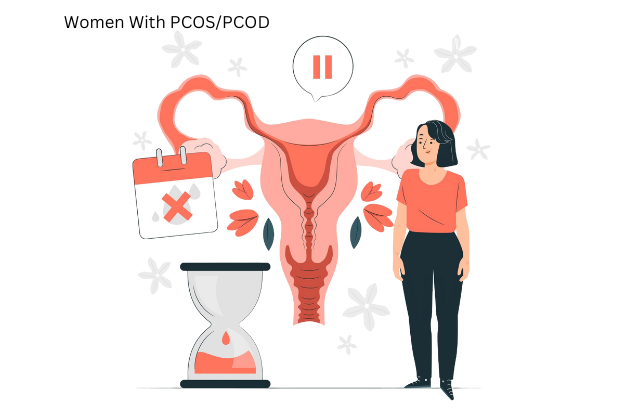Polycystic Ovary Syndrome (PCOS) or Polycystic Ovary Disease (PCOD) is a common hormonal disorder that affects women of reproductive age. Research indicates that about 10-15% of women globally suffer from PCOS/PCOD. Despite its prevalence, many women struggle to find clear information and effective treatment options. At Gracious IVF, we are committed to providing holistic, evidence-based solutions for managing PCOS/PCOD.

What is PCOS/PCOD?
PCOS/PCOD occurs when a woman’s ovaries produce higher-than-normal amounts of androgens (male hormones). This hormonal imbalance can lead to:
- Irregular or absent menstrual cycles
- Difficulty in ovulation, impacting fertility
- Development of small cysts on the ovaries
- Symptoms like acne, excessive hair growth, and weight gain
While PCOS and PCOD are often used interchangeably, some experts distinguish them based on severity and geographical terminology.
Symptoms of PCOS/PCOD
Recognizing the symptoms early can help in managing the condition effectively. Common symptoms include:
- Irregular periods: Fewer than 8 periods a year or prolonged cycles.
- Excess androgen: Acne, excessive hair growth (hirsutism), and thinning scalp hair.
- Polycystic ovaries: Enlarged ovaries with multiple small cysts visible on ultrasound.
- Weight gain or obesity: Difficulty in losing weight despite efforts.
- Fertility issues: Challenges in conceiving due to irregular ovulation.
Understanding the Causes
While the exact cause of PCOS/PCOD is unknown, several factors play a role:
- Insulin resistance: Over 70% of women with PCOS experience insulin resistance, leading to increased androgen production.
- Hormonal imbalance: Excess luteinizing hormone (LH) and low levels of follicle-stimulating hormone (FSH) disrupt ovulation.
- Genetics: A family history of PCOS may increase the risk.
- Lifestyle factors: Poor diet and lack of exercise exacerbate symptoms.
Treatment Options for PCOS/PCOD
Treating PCOS/PCOD involves a multifaceted approach that includes lifestyle changes, medical treatments, and, in some cases, assisted reproductive technologies. Here’s a comprehensive guide:
1. Lifestyle Modifications
Lifestyle changes are often the first line of defense against PCOS/PCOD. These include:
- Healthy diet: Adopt a low-glycemic index (GI) diet rich in whole grains, lean proteins, fruits, and vegetables. Avoid processed foods and sugary drinks.
- Regular exercise: Engage in at least 150 minutes of moderate exercise per week to improve insulin sensitivity and aid weight management.
- Weight management: Losing just 5-10% of body weight can significantly improve symptoms and restore ovulation.
2. Medical Treatments
Medications can help manage symptoms and improve fertility:
- Birth control pills: Regulate menstrual cycles and reduce androgen levels.
- Metformin: Improves insulin resistance and lowers blood sugar levels.
- Clomiphene or Letrozole: Stimulates ovulation in women trying to conceive.
- Spironolactone: Reduces excessive hair growth and acne.
Consult with a specialist at Gracious IVF to determine the best medication for your specific needs.
3. Fertility Treatments
For women facing difficulty conceiving, fertility treatments include:
- Ovulation induction: Medications like Clomiphene help stimulate egg release.
- Intrauterine insemination (IUI): A less invasive fertility treatment.
- In vitro fertilization (IVF): Recommended for severe cases of PCOS-related infertility.
4. Alternative Therapies
Many women find relief in complementary therapies:
- Acupuncture: May improve ovulation and reduce stress.
- Herbal remedies: Supplements like inositol and vitamin D are known to aid insulin resistance.
- Mindfulness practices: Yoga and meditation help manage stress, which can exacerbate symptoms.
Long-Term Management
PCOS/PCOD requires ongoing management to prevent complications such as type 2 diabetes, cardiovascular issues, and endometrial cancer. Regular monitoring, including blood sugar and cholesterol levels, is crucial. Work closely with healthcare professionals to adjust treatments as needed.
FAQs About PCOS/PCOD
Q1: Can PCOS/PCOD be cured completely?
PCOS/PCOD cannot be cured entirely but can be effectively managed through lifestyle changes, medication, and regular monitoring.
Q2: How long does it take to see improvements after starting treatment?
Many women notice improvements in symptoms within 3-6 months of lifestyle changes and medical treatment.
Q3: Can I get pregnant with PCOS/PCOD?
Yes, many women with PCOS/PCOD conceive with the help of lifestyle modifications and fertility treatments.
Q4: Are there any natural remedies for PCOS/PCOD?
A balanced diet, regular exercise, and stress management are effective natural remedies. Supplements like inositol may also help.
Q5: How is PCOS/PCOD diagnosed?
Diagnosis involves a combination of medical history, physical examination, blood tests, and ultrasound imaging.
Why Choose Gracious IVF?
At Gracious IVF, we provide personalized care to address the unique challenges of PCOS/PCOD. Our team of experts uses the latest technologies and holistic approaches to improve your fertility and overall health.
Take control of your PCOS/PCOD today. Contact Gracious IVF for expert guidance and compassionate care.

